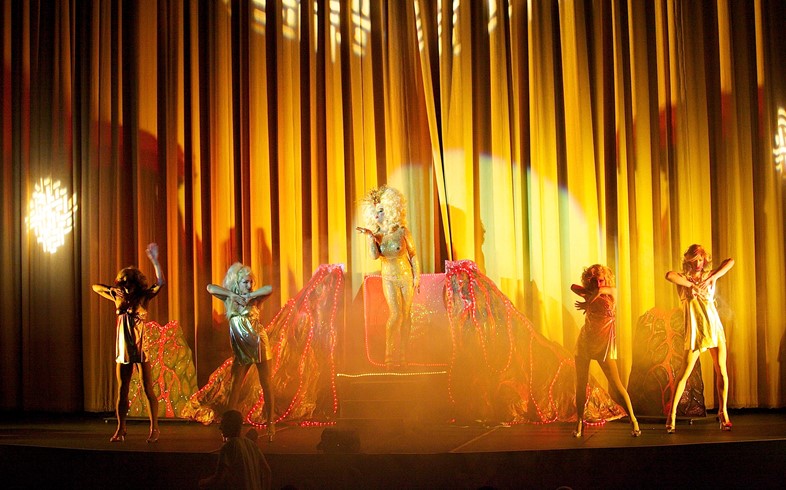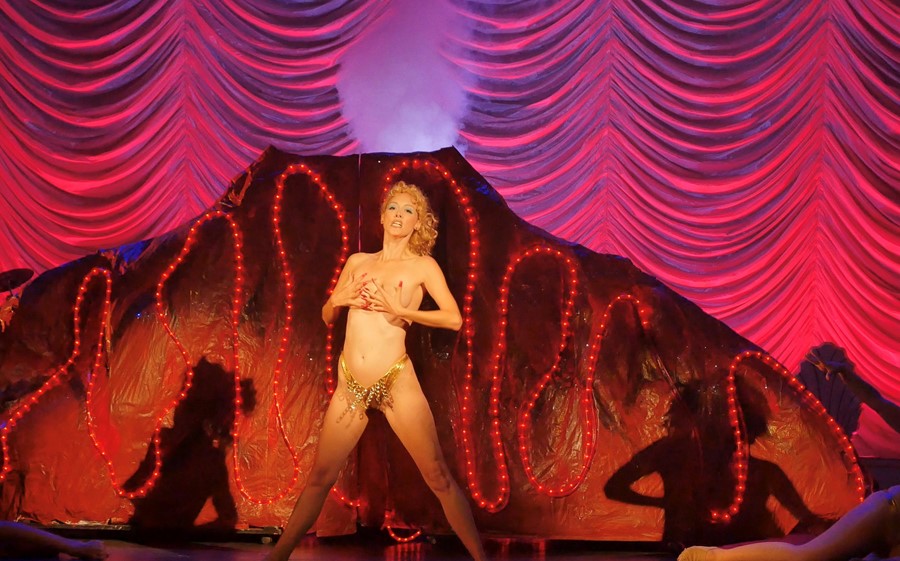You Don’t Nomi: Jeffrey McHale speaks on his new documentary about the different ways in which people connect with this fabulously tacky film
When Showgirls came out in 1995, it was savaged by film critics and failed to find a mainstream audience. Even now it holds a paltry 22 per cent fresh rating on Rotten Tomatoes. But over the years, this deliberately ostentatious and often nonsensical erotic drama from director Paul Verhoeven (Basic Instinct, RoboCop) has become an all-time great cult classic. If you want to wear a T-shirt branded “Versayce”, as Elizabeth Berkley’s stripper-turned-showgirl Nomi Malone famously mispronounces Versace in the film, the internet has one waiting for you.
Editor and director Jeffrey McHale is so fascinated by Showgirls’ partial rehabilitation that he’s made a very affectionate but still-critical documentary about the different ways in which people connect with this fabulously tacky film. The punningly-titled You Don’t Nomi doesn’t gloss over Showgirls’ problematic rape scene or excuse the fact that its black characters exist solely to help Nomi, but it definitely adds to its complex legacy. Featuring contributions from a range of critics and performers who’ve clearly spent time contemplating what Showgirls is about, it sheds new light on Verhoeven’s technical skills and the film’s unexpected feminist and queer appeal.
“I didn’t really want to make the traditional behind-the-scenes ‘making of’ Showgirls,” McHale says. “I feel like Showgirls is so much about the audience response and our relationship to it. It’s kind of this ever-evolving thing.” Here, McHale shares his thoughts on why we’re still talking about Showgirls 25 years after it (supposedly) flopped.

Nick Levine: At what point did you realise you wanted to make a documentary about Showgirls?
Jeffrey McHale: I was at the Showgirls screening [in LA in 2015] where Elizabeth Berkley came out and introduced the film – it felt like you were witnessing cult film history right in front of you. And the fact she said ‘this is the first time I’m gonna watch this film with a crowd that’s really embraced it’ stuck with me. So after that I really wanted to dive deeper into Showgirls and consume everything that had been written about it. I was so fascinated by the wide range of opinions that this film inspires, and that made me realise there might be something worth exploring a little deeper.
NL: In a way Showgirls exists alongside other camp cult classics like Valley of the Dolls and Mommie Dearest, which you explore in your documentary, but it also feels more complicated than those films. Saying Showgirls is ‘so bad it’s good’ doesn’t really explain its appeal, does it?
JM: Yeah, that’s interesting. If you think about it, no one’s really talking about Valley of the Dolls or Mommie Dearest on a technical level. But it’s clear from Verhoeven’s body of work that he’s a very talented filmmaker – he’s smart, he’s a provocateur and he places satire in all of his films. I think he was definitely aiming for something very specific with Showgirls and it didn’t come out quite the way he intended. In a way, that’s the beauty of the film: it has this kind of failed seriousness to it. I think that’s what people are drawn to; Showgirls succeeds because of the unique nature of its failures.
NL: Do you think Showgirls becomes more fascinating as time goes on because it’s so grotesque and overblown where most film and TV now is more naturalistic?
JM: You know, I read somewhere that Showgirls killed a genre: those big glossy erotic thrillers of the 90s. Sex kind of stopped selling in the cinema so it went to TV. HBO and Showtime are where people are pushing the boundaries with sex now. And I think we do have this naturalistic and realistic presentation in what we watch now – look at superhero movies; they all go for that kind of gritty depiction of what were originally comic book characters. Whereas Showgirls is just like nothing you’ve ever seen before. The dialogue, the characters, the acting, the visuals, it’s all so over-the-top. I just love watching it with someone who’s never seen it before to see how they react.
NL: As you explore in your documentary, the way Nomi reinvents herself when she arrives in the big city and forms a sort of chosen family is a very relatable narrative for queer people. And yet Showgirls is a film made by a straight male director from a screenplay by a straight male screenwriter. Do you think this queerness happened by accident?
JM: Oh, you can fully tell that Showgirls was not intended for us. But when you think about the way it was rejected and mocked and ridiculed when it came out, I think on a subconscious level that triggered this kind of queer mentality of ‘you don’t want this, so we’ll take it in’. But I hadn’t really thought about Nomi’s journey being so uniquely queer until my contributor Matt Baume said it [in the documentary]. It’s one of the things about Showgirls that I find so funny: you have these two straight guys who made this film that somehow resonates with the queer community.
NL: In your documentary, writer-performer April Kidwell says very movingly that portraying Nomi in a Showgirls tribute musical has been empowering for her and actually helped her to recover from PTSD after she was raped. Do you think we can perceive Showgirls as feminist?
JM: I don’t necessarily think feminist ideals were guiding the production of this film, but that doesn’t mean women can’t find feminist messages within it. People are drawn to the film in different ways, and sometimes those ways don’t necessarily align with each other, but that’s the beauty of it really. Because even though those views don’t align, they don’t compete with each other either.
NL: Finally, what do you think Showgirls’ legacy – if that’s not too grand a word – will ultimately look like?
JM: I think it will have its place in film history, but it’s hard to know exactly what that place will be and the conversations we’ll have about it in the future. It’s fascinating that Showgirls was once viewed as the worst film of all time, and yet there’s so much focus and attention and excitement around it now. You don’t get that kind of attention even with good films that win Academy Awards – people aren’t talking about them years and years later. So it kind of challenges ideals of what is good and what is bad and what is deemed a failure. And I think it will continue to do that. My contributor Haley Mlotek says it perfectly in the film: ‘We’re still talking about Showgirls because we’re not done with it.’ And I think we won’t be done with it for a while. It’s so many different things to so many different people.
You Don’t Nomi is out now via Premium Video on Demand.
